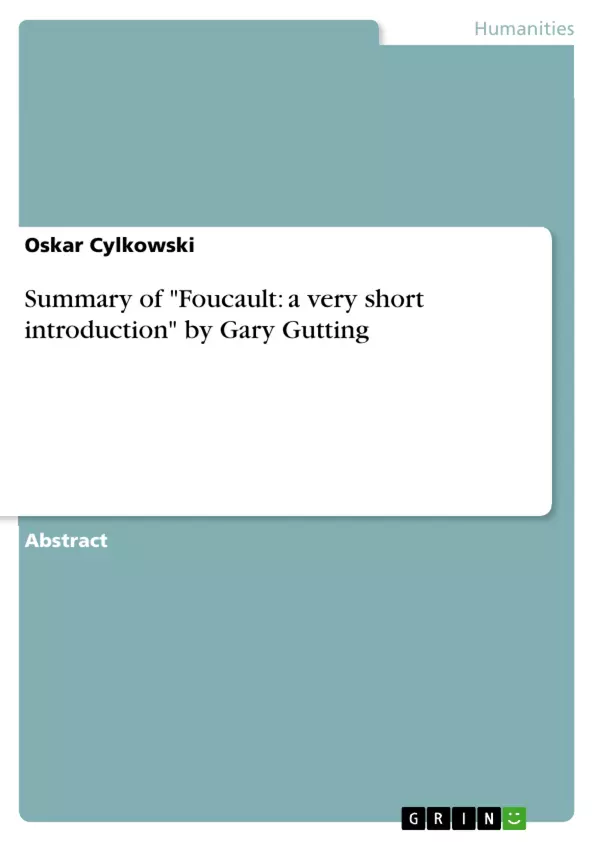This text is about the philosopher Foucault from the post modernism era. It is a summary of the book "Foucault: a very short introduction" by Gary Gutting from 2005.
The book deals with the work and life of Foucault. It is subdivided into ten chapters mostly telling the reader about the thoughts and opinions Foucault had on different topics. Foucault’s main focus is the relationship between knowledge and power especially concerning societal institutions like psychiatry and jail. With his point of view, Foucault had a big impact on the academic world and most likely on the field of cultural studies.
Inhaltsverzeichnis (Table of Contents)
- Lives and Works
- Literature
- Politics
- Archeology
- Genealogy
- The Masked Philosopher
- Madness
- Crime and Punishment
- Modern Sex
- Ancient Sex
Zielsetzung und Themenschwerpunkte (Objectives and Key Themes)
The book “Foucault: A Very Short Introduction” provides a concise overview of the life and work of Michel Foucault, examining his ideas about power, knowledge, and their relationship to social institutions. It explores Foucault’s unique approach to history and his critiques of traditional philosophical and social theories.
- The relationship between knowledge and power
- Foucault’s historical methods, “archaeology” and “genealogy”
- The role of institutions in shaping individual identities and behaviors
- The evolution of modern disciplinary systems and their impact on society
- The importance of problematizing social norms and power structures
Zusammenfassung der Kapitel (Chapter Summaries)
- Lives and Works: This chapter introduces Foucault’s life and the various interpretations of his work. It highlights his early academic success, his political activism, and his fascination with non-conformist figures like Raymond Roussel.
- Literature: This chapter focuses on Foucault’s ideas about authorship and the role of the author in shaping language and experience. It explores Foucault’s critique of the self-expressive author and his analysis of writers like Georges Bataille, who challenged societal boundaries.
- Politics: This chapter explores Foucault’s political views, emphasizing his reluctance to be categorized as a specific political ideology. It examines his concepts of “universal intellectual” and “specific intellectual,” and his emphasis on the importance of direct experience in political analysis.
- Archeology: This chapter delves into Foucault’s historical method, "archaeology," which seeks to uncover the underlying structures and assumptions of a particular time period. It explores how Foucault used this method to analyze different historical periods, including the history of madness, sexuality, and medicine.
- Genealogy: This chapter examines Foucault’s later historical method, "genealogy," which explores the historical development of knowledge and power relations. It focuses on Foucault’s analysis of power as both a repressive and productive force, and his critiques of traditional philosophical notions of power.
- The Masked Philosopher: This chapter discusses Foucault’s rejection of traditional philosophical categories and his focus on analyzing the present situation rather than seeking absolute truth. It examines his critique of Kant’s Enlightenment project and his emphasis on historical contextualization in understanding philosophy.
- Madness: This chapter explores Foucault’s examination of madness, arguing that its historical treatment reflects societal power dynamics and the evolution of moral norms. It analyzes Foucault’s interpretation of the development of asylums as institutions of power and his view on the significance of “probing the limits of reason.”
- Crime and Punishment: This chapter delves into Foucault’s analysis of the modern prison system in “Discipline and Punish.” It outlines the shifts in punishment practices from public displays to discreet surveillance and control. It explores Foucault’s concept of “disciplinary power” and its mechanisms, including hierarchical observation, normalizing judgment, and the examination.
- Modern Sex: This chapter examines Foucault’s work on the history of sexuality, specifically his critique of the “repressive hypothesis” and his exploration of how modern power constructs categories of sexuality. It introduces the concept of “biopower” and its implications for controlling populations and individual lives.
Schlüsselwörter (Keywords)
The book “Foucault: A Very Short Introduction” focuses on key concepts like power, knowledge, history, discourse, discipline, and the individual. It analyzes the historical development of institutions like asylums, prisons, and modern science, and explores how these institutions contribute to the construction of identity and the exercise of power.
- Citar trabajo
- Oskar Cylkowski (Autor), 2017, Summary of "Foucault: a very short introduction" by Gary Gutting, Múnich, GRIN Verlag, https://www.grin.com/document/490796




